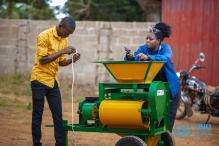The landmark Security Council resolution 2250 (2015) on Youth, Peace and Security (YPS) recognized the potential of young people to respond to pressing peace and security issues and global threats. As the global climate crisis intensifies, it has become increasingly clear that climate change not only exacerbates conflict risks but also creates new forms of exclusion for young people – particularly in fragile or conflict-affected settings. At the same time, climate action is emerging as a powerful entry point for youth to engage meaningfully in peacebuilding, especially when programming is designed to help empower youth leadership, and address the socioeconomic and livelihood needs facing young people and their communities.
This cohort study explores how 10 Peacebuilding Fund (PBF)-supported projects between 2018 and 2022 have used climate action as a pathway for youth inclusion in peace and security. These initiatives include efforts to support youth-led climate adaptation, promote sustainable and youth-inclusive natural resource governance, and reduce intercommunal tensions linked to environmental stress. By positioning young people as leaders in climate response, these projects also enabled their broader engagement in decision-making, mediation, and conflict prevention. The research and findings for this cohort study form part of a larger year-long Thematic Review on Youth, Peace and Security, which examined how PBF-supported peacebuilding programming has been advancing the YPS agenda.
Access the brief here.
Suggested citation: Erica Gaston. Youth in climate, peace and security, and environmental peacebuilding : UNU-CPR, 2025.

